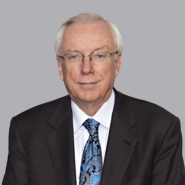MPEP Changes to Election Practice in Markush Groups
- April 17, 2023
- Firm News
Associated People
Without a notice or comment period required by the Administrative Procedures Act (APA) the USPTO on March 3, 2023 modified the MPEP Chapter 800 relating to restrictions and double patenting including § 803.02 relating to election of species in claims with Markush groups. This revision was made effective July 22, 2022. On October 22, 2022 the USPTO requested comments on several topics including its restriction practice for Markush groups found is MPEP § 803.02. See Fed. Reg. https://www.regulations.gov/document/PTO-P-2022-0025-0001, at page 60133. After two extensions of the due date for comments were due February 28, 2023, less than 3 days later the USPTO published its MPEP revisions which included significant changes to the Markush practice. Thus, foreclosing any possible comments on them even though the changes were effective 3 months before the request for comments was printed.
The changes to Markush practice were not minor and affected the rights of applicants to obtain claims to what they regarded as their invention, see 35 U.S.C. §112(b). The major changes to the Manual are with changes highlighted in bold:
803 - … there would be a serious search and/or examination burden on the examiner if restriction is not required …
803.02- An election of species requirement is a type* of restriction requirement.
806.01- Authorizing a provisional election of a single species "where only generic claims are presented and the generic claims recite or encompass such a multiplicity of species that an unduly extensive and burdensome search is necessary. See MPEP § 803.02 and § 808.01(a)
808.02 - ...the examiner, in order to establish reasons for insisting upon restriction, must explain why there would be a serious search and/or examination burden on the examiner if restriction is not required.
To demonstrate serious examination burden separate from a serious search burden, the examiner must show by appropriate explanation that the inventions are likely to raise serious examination issues, such as non-prior art issues under 35 U.S.C. 101, pre-AIA 35 U.S.C. 112, first paragraph and/or 35 U.S.C. 112(a).
In this situation, a serious examination burden may exist where issues relevant to one invention are not relevant to the other invention.
There is no consideration of the burden to file continuing/divisional applications to the non-elected inventions as required if this promulgated as a rule. Serious search or examination burdens do not establish the independent and distinctness of the inventions required for the 35 U.S.C. § 121 safe harbor. By sandbagging the public, the USPTO avoided comments on the revised MPEP sections on Markush groups. The USPTO also avoided having to defend its dividing up a single invention simply because of alleged burden and not patentable distinctness. The change regarding a generic invention is troubling since Markush claims were intended to deal with inventions where no generic term existed. The USPTO cites no authority for these changes.
Since the effect of these changes is to further restrict a patent applicant’s rights, it looks very much like a substantive patent law interpretation which the USPTO does not have the power to promulgate. Even if not substantive, since it acts both prospectively and, on the applicant, the. USPTO is required by the APA to proceed by rule making which the USPTO has avoided since the APA became law. Recently the Federal Circuit remanded Apple v Vidal here to determine if the USPTO’s Fintiv regulations had been properly promulgated.










 Counseling & Strategic Advice
Counseling & Strategic Advice IP Transactions
IP Transactions Litigation
Litigation PTAB Proceedings
PTAB Proceedings Start-Up
Start-Up Technology Transfer
Technology Transfer Trademark & Designs
Trademark & Designs U.S. Patent Procurement (Application Drafting & Prosecution)
U.S. Patent Procurement (Application Drafting & Prosecution)








